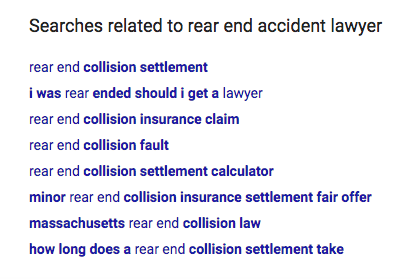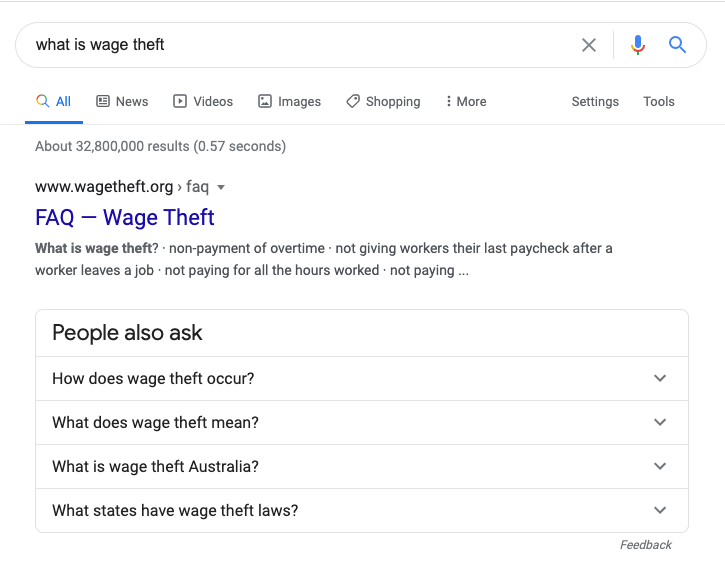You may have noticed at the bottom of your Google searches a section titled “People Also Search for” with a list of keyword searches similar to yours. Or maybe you’ve stumbled upon the “People also ask” block that includes lists of questions and answers similar to your query.
These underrated tools can help you better understand your clients’ needs and target the ideal potential claimant through digital search. By spending some time going through Google's search results pages, you can learn a lot about your potential claimants and what they are searching.
Searches related to
These are an easy way to find out what potential clients are searching for and what you can do to target these potential clients. You can come up new content ideas for your firm’s blog as well as adjust what you’ve already posted to help align yourself with these searches.
Do a quick keyword search and examine the "Searches related to" for similar searches. For example, if you are a personal injury attorney looking to increase your auto accident cases, search various keywords that are related to auto accidents.
If you were to search “rear end accident lawyer” the following results appear:

From these related queries, you can see what prospective clients are searching for. You could then create content based off these. Pages like “Why you need a lawyer for a rear end collisions,” “How to prove fault in a rear end collision,” or “How to calculate your settlement from rear end accident,” etc. can be added to your site and target a specific claimant.
Searching keywords and phrases that your firm already ranks for or is looking to rank for and examining the “searches related to” will help give better insight to your firm and what other keywords and phrases you need to optimize for.
People also ask
While searching a question on Google, you often find a “People also ask” section with questions that other people have searched that are related to your query. Clicking on the down arrow next to the questions will give an answer to the question, as well as allow you to search the question. New questions will appear.
Again, these allow you to better understand what content your audience is looking for. Finding out the types of questions people are asking will help your firm understand what information people want to know.
If someone searches “What is wage theft”, Google pulls questions like “What States Have Wage Theft Laws?” and “How Does Wage Theft Occur”. Because of this, you can post a piece of content about wage theft and the different details about it.

People also search for
“People also search for” does not appear right away on Google searches. Instead, if you search something, click on a result and then return back to the results page, a list of related searches appears underneath the result you had originally clicked on. This is to help those who do not find the result they were looking for in the first site they visit.
By searching a keyword your firm ranks for, clicking on your firm’s landing page and then back to the results page, you will find the people also search for that is related to your ranking keyword. Again, this can help gain a better understanding of what keywords are being searched by clients that may be looking for your services. By determining what content Google thinks is a better suggestion than your firm’s pages you can create and optimize content to appear on these search results pages as well.
These three results can appear for just one keyword or phrase, but can pull different search terms. Take a few minutes to look through the different search features. Your firm’s site, blog, and overall SEO can all flourish from a little extra effort spent on Google’s search result pages.
www.jurisdigital.com/googles-new-feature-people-also-search-use-advantage/
www.internetmarketingninjas.com/blog/search-engine-optimization/googles-people-also-ask-related-questions/